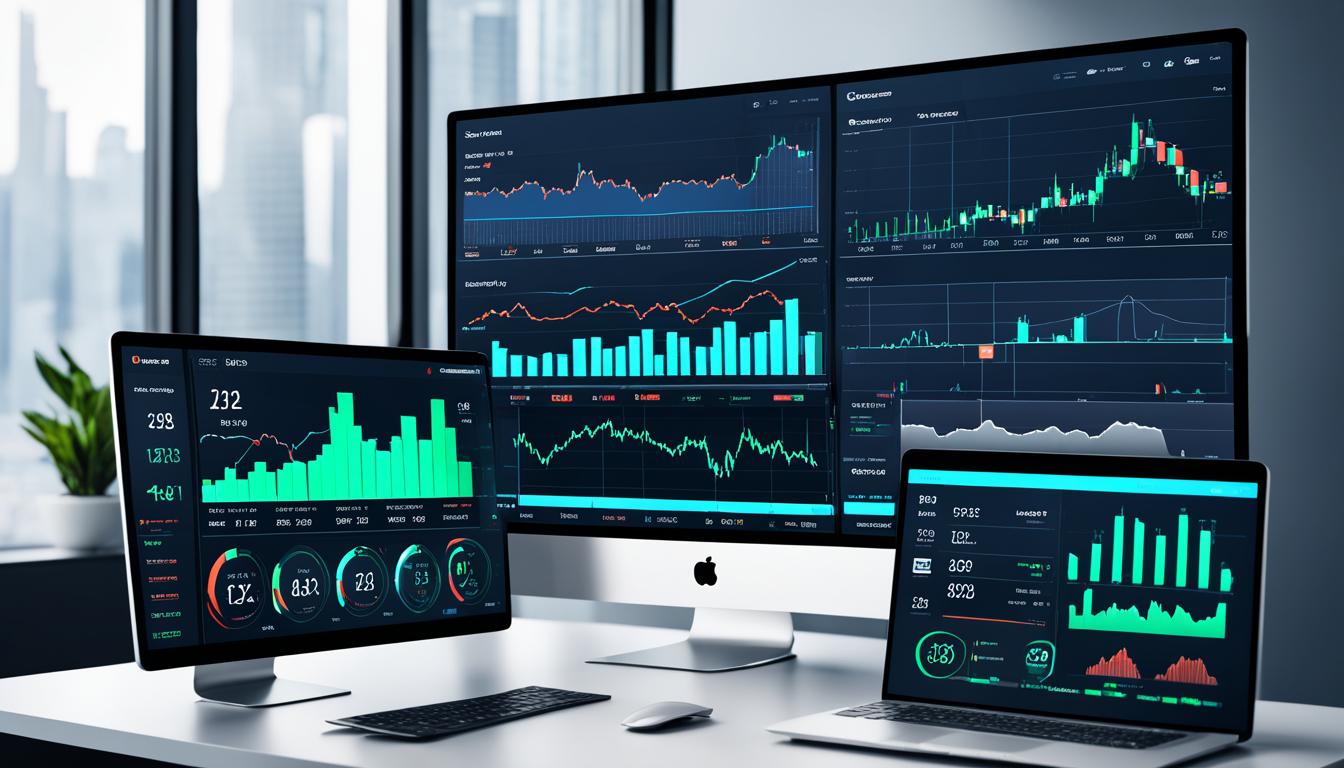
Did you know there are over 600 cryptocurrency exchanges worldwide? Each one offers different services and features. Finding the right platform is key for safe and efficient trading.
This guide will help you pick the best platform. We’ll look at jurisdiction, ease of use, liquidity, asset choices, security, reputation, fees, and customer support. It’s useful for both new and experienced traders in cryptocurrency trading.
With over 600 exchanges and many platforms, choosing can be tough. But with the right info, you can pick a platform that matches your goals and risk level.
Factors to Consider When Choosing a Crypto Exchange
Choosing the right crypto exchange is key when you start trading cryptocurrencies. The place where a crypto exchange operates is very important. It affects who they can trade with and where they can do business. Make sure the exchange works in your area.
Ease of Use
For new investors, how easy an exchange is to use is crucial. Look for exchanges with interfaces that are easy for beginners. A simple platform can help you understand digital assets better.
Liquidity
Liquidity is key when picking a crypto exchange. A liquid exchange means lots of trading and a big order book. This lets you trade quickly and at good prices. Choosing a liquid exchange makes trading smoother.

Think about the exchange’s location, ease of use, and liquidity before you decide. This helps you pick one that fits your investment goals and how you like to trade.
Assessing the Asset Choices and Security Measures
Choosing a cryptocurrency trading platform means looking at the cryptocurrency selection and security features. Big coins like Bitcoin and Ethereum are common, but smaller assets might need special exchanges. Security is key to keep your money safe from hackers and unauthorized access.
Asset Choices
Binance is huge, offering over 500 coins and tokens. Coinbase supports Bitcoin, Ethereum, Litecoin, and Bitcoin Cash, but has fewer options. Make sure the platform fits your investment goals and how much risk you can take.
Security Features
Look for exchanges with cold storage, multi-signature wallets, and SOC 2 certification. These show they care about your safety and protect against cyber threats. Also, pick exchanges with a good security record and no big hacks.

“In 2019, Binance was hacked, resulting in the loss of 7,000 Bitcoins, prompting increased security measures.”
By looking at asset choices and security, you can pick a trustworthy exchange. This way, you can safely invest in digital assets.
Evaluating Reputation, Fees, and Customer Support
Choosing the right cryptocurrency trading platform is key. You need to look into the exchange’s reputation, fees, and customer support. This ensures you pick a reliable and affordable platform that suits your trading needs.
Reputation
Reputation matters a lot when picking a crypto exchange. Read user reviews and get feedback from the crypto community. A trusted exchange with a good reputation offers a safe and reliable trading space.
Trading Fees
It’s important to know the exchange’s fees, including any discounts for using their tokens. Compare fees like maker/taker fees and withdrawal fees to find a good deal. [Exchanges like Binance, Kraken, and KuCoin have good fees, with Binance charging up to 0.1% and Kraken from 0% to 0.26%.]
Customer Support
Check how good the exchange’s customer support is. You might need help with account issues or urgent trading questions. Choose an exchange with support via email, live chat, and phone. Look for one known for quick and helpful support.
| Exchange | Reputation | Trading Fees | Customer Support |
|---|---|---|---|
| Binance | High trading volumes, indicating trust | Up to 0.1% fees, with discounts for using Binance Coin | 24/7 support, multiple communication channels |
| Kraken | Renowned for transparency and security | Fees ranging from 0% to 0.26%, competitive pricing | Responsive support, with email and live chat options |
| KuCoin | Offers a wide range of cryptocurrencies, including lesser-known coins | Trading fees starting at 0.1% for both makers and takers | Comprehensive support through multiple channels, including a dedicated Telegram community |
By looking at an exchange’s reputation, fees, and support, you can make a smart choice. Pick a platform that fits your trading goals and likes.
Others also read this article : Top 10 Strategies for Successful Cryptocurrency Trading
Understanding Insurance and Tech Infrastructure
Choosing a cryptocurrency exchange means looking at their insurance for user funds. Some exchanges have crypto exchange insurance. This can protect your money if there’s a security issue or disaster. But, make sure you know what the insurance covers, as it might not be like what banks offer.
The tech behind the exchange is also key. It includes the matching engines that make trades happen fast and well. Plus, the exchange should be able to add new trading pairs and order types to help users.
Insurance for Cryptocurrency Exchanges
Custodial insurance and SIPC insurance offer some protection, but know their limits. Check the exchange’s insurance details to see if it fits your investment goals and risk level.
“The crypto industry is rapidly evolving, and exchanges must have a robust technology stack to keep up with the demands of users and the market.”
Think about both the insurance and tech of a cryptocurrency exchange before choosing. This way, you can pick the best one for your investment needs.
How to choose the right cryptocurrency trading platform
Choosing the right cryptocurrency trading platform is key to your investment success. When picking a platform, think about your personal investment goals and trading experience. Look for a platform that fits your needs and likes.
First, check where the platform is based. This affects the laws and safety around trading. It’s also vital to find a platform that’s easy to use, especially if you’re new to trading. Quick buying and selling is important for smooth trading.
Look at the types of assets the platform offers and how safe it keeps your money. Check the fees, customer support, and the platform’s reputation too.
The best platform for you depends on your investment goals and experience. Think about these things to make a smart choice. This way, you can start your crypto trading journey with confidence.
“The right cryptocurrency trading platform can make all the difference in your investment success. Take the time to find the one that aligns with your needs and goals.”
Leverage and Trading Products Offered
Trading in cryptocurrency can be thrilling, but it’s key to know the risks, especially with advanced tools like derivatives and leverage. These tools offer more chances for skilled traders, but they also mean bigger gains and losses.
Top cryptocurrency exchanges provide a variety of cryptocurrency derivatives, like futures and options. These let traders bet on where cryptocurrency prices will go in the future. With leverage trading, your trading power can grow, but so does your risk.
| Platform | Maximum Leverage | Standard Fees | Leverage Trading Products |
|---|---|---|---|
| Binance | 125x | Margin trading – 0.1%; futures trading – 0.02% for makers, 0.05% for takers; options trading – 0.03% | Margin trading, futures trading, options trading, and leveraged tokens |
| Kraken | 50x | Spot margin trading – 0.1%-0.2%; futures trading – 0.02% for makers, 0.05% for takers | Spot margin trading and futures trading |
| Coinbase | 10x | Margin trading – 0.4% for makers, 0.6% for takers; futures trading – 0.02% for makers, 0.04% for takers | Margin trading and futures trading |
Before diving into leveraged trading or advanced products, make sure you know your risk level and trading skills. Start small, keep learning, and stay disciplined to reach your financial goals.
“Leverage in crypto trading can amplify trading capacity up to 100 times the original capital, but it also increases the potential for substantial losses. Manage your risk carefully.”
Comparing Cryptocurrency Exchanges and Brokers
When you step into the world of cryptocurrency, you can choose between crypto exchanges and traditional brokers with digital assets. Each has its own set of features and benefits. Let’s dive into the main differences.
Popular Crypto Exchanges
Platforms like Coinbase, Kraken, Gemini, and Crypto.com offer hundreds or thousands of digital assets. These cryptocurrency exchanges have advanced trading tools, such as margin trading and futures. But, they might be harder for beginners than traditional brokerages.
Traditional Brokers with Crypto Offerings
Brokers like Robinhood and Fidelity now let you trade cryptocurrencies. They offer a simple interface for those used to traditional finance. But, they don’t have as many digital assets as crypto exchanges.
Choosing between a cryptocurrency exchange or a traditional broker with crypto depends on what you need and want. Think about the variety of assets, trading tools, ease of use, and reputation to pick the best platform for you.
Choosing a Beginner-Friendly or Advanced Platform
Choosing the right cryptocurrency trading platform depends on if you’re new or experienced. Beginner-friendly crypto exchanges like Coinbase are simple and easy to use. They have clear interfaces and basic order types. These platforms are perfect for those just starting out in crypto.
For those with more experience, platforms like Kraken Pro offer more features. They have customizable charts, detailed order books, and various order types. If you aim to improve your trading skills, these advanced platforms are a good choice.
Think about your current trading skills and future goals when picking a platform. Binance is a good option for both beginners and experts. It offers a wide range of cryptocurrencies and easy-to-use features.
“The key is to find a platform that not only meets your current needs but also has the potential to support your growth as a crypto trader.”
By looking at your trading needs and skills, you can find the best platform for your crypto journey.
Others also read this article : When Cryptocurrency Started: A Digital Revolution
Comparing Beginner-Friendly and Advanced Platforms
| Feature | Beginner-Friendly Platforms | Advanced Platforms |
|---|---|---|
| User Interface | Simplified, intuitive | Highly customizable, data-rich |
| Order Types | Basic (market, limit) | Sophisticated (stop-loss, trailing stop, etc.) |
| Charting Tools | Limited | Extensive, advanced analytics |
| Cryptocurrency Selection | Curated, mainstream coins | Diverse, including altcoins and new listings |
| Fees | Flat, predictable | Tiered, volume-based |
Prioritizing Your Needs as an Investor or Trader
When picking a crypto trading platform, think about what you need as an investor or trader. Your personal investment goals, trading strategy, and how much risk you can handle are key. Also, consider the cryptocurrencies you want to trade, your security concerns, and the need for low fees. This helps you choose the right exchange for your crypto goals.
For example, if you aim to trade big cryptocurrencies like Bitcoin and Ethereum, look for high liquidity and fast order execution. If you’re into diversifying your portfolio with many altcoins, make sure the platform has a wide selection.
Security is very important. You want to use an exchange with strong security measures, like two-factor authentication and cold storage. The platform’s reputation, customer support, and fees also matter for your trading success and profits.
Think about these factors and match them with your investment goals and trading style. This way, you can pick the best crypto trading platform for you.
Securing and Storing Your Cryptocurrency Assets
When you step into the world of cryptocurrency, deciding how to keep your digital assets safe is key. You’ll find different types of wallets, each balancing ease of use against security. Knowing the differences between hot wallets, cold wallets, and self-custody can guide you to a choice that fits your investment goals and how much risk you can handle.
Hot wallets, like those from exchanges, are easy to use and give you quick access to your money. But, they also mean you’re giving up control of your private keys. On the other hand, cold wallets, which keep your assets offline, are more secure but might not be as handy for daily transactions.
If you want full control over your crypto wallet types, self-custody with a personal wallet is a good choice. You keep your private keys and have full control over your assets. But, you also have to make sure you keep your digital keys and seed phrases safe.
| Wallet Type | Custody | Security | Convenience |
|---|---|---|---|
| Hot Wallet | Exchange Custody | Lower | Higher |
| Cold Wallet | Self-Custody | Higher | Lower |
Choosing between hot and cold wallets, or self-custody versus exchange custody, is up to you. Think about what security level you want and what’s best for your investment plan. By weighing the good and bad of each option, you can pick a way that protects your crypto assets and fits your investment style. For more on how to analyze stocks smartly, read this article: Fundamental Analysis: Key to Smart Stock.
Conclusion
Choosing the right platform for trading cryptocurrencies is key to my investing journey. I look at things like where the exchange is located, how easy it is to use, how much trading it does, the types of assets it offers, how secure it is, its reputation, the fees it charges, and the support it gives to customers. This helps me find an exchange that fits my needs and what I like as an investor or trader.
It’s also important to know about insurance, tech setup, leverage, and the differences between exchanges and brokers. This knowledge helps me make a smart choice.
To pick the best crypto exchange, I focus on my goals and what I need for security. I look at important factors like choosing the right exchange and making sure my trading is secure and efficient. This leads me to the best platform for my digital assets.
Choosing the best platform for trading cryptocurrencies is a big step in the world of crypto. By thinking about the important factors and matching my needs with the options available, I can start my crypto investing with confidence and safety.





